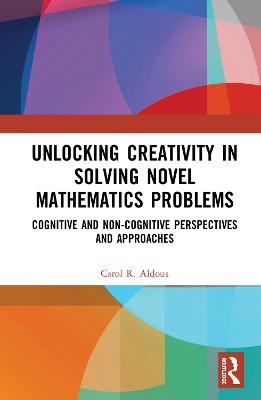
Unlocking Creativity in Solving Novel Mathematics Problems
Routledge (Verlag)
978-0-367-00171-1 (ISBN)
Unlocking Creativity in Solving Novel Mathematics Problems delivers a fascinating insight into thinking and feeling approaches used in creative problem solving and explores whether attending to ‘feeling’ makes any difference to solving novel problems successfully.
With a focus on research throughout, this book reveals ways of identifying, describing and measuring ‘feeling’ (or ‘intuition’) in problem-solving processes. It details construction of a new creative problem-solving conceptual framework using cognitive and non-cognitive elements, including the brain’s visuo-spatial and linguistic circuits, conscious and non-conscious mental activity, and the generation of feeling in listening to the self, identified from verbal data. This framework becomes the process model for developing a comprehensive quantitative model of creative problem solving incorporating the Person, Product, Process and Environment dimensions of creativity.
In a world constantly seeking new ideas and new approaches to solving complex problems, the application of this book’s findings will revolutionize the way students, teachers, businesses and industries approach novel problem solving, and mathematics learning and teaching.
Carol R. Aldous, BSc (Hons) developmental genetics, PhD (mathematics education and creative problem solving) is a senior lecturer in science and mathematics education at Flinders University, Adelaide, Australia. She leads a South Australian government-funded STEM industry engagement project and passionately researches the role of creativity in problem solving.
Introduction, Section 1: Defining Creativity in Problem Solving: Cognitive and Non-Cognitive Approaches to Reasoning, 1: Why Study Creativity in Problem Solving?, 2: Macroscopic and Microscopic Models of Creativity, Section 2: Constructing and Testing a Conceptual Framework of Creative Problem Solving , 3: Constructing the Framework: The Particular Case, 4: Constructing the Framework: The General Case Part 1 – Forming the Scales, 5: Constructing the Framework: The General Case Part 2 – Confirming the Scales, Section 3: Constructing and Testing a Comprehensive Model of Creative Problem Solving in Mathematics , 6: Causal Modelling: Toward a Comprehensive Model of Creative Problem Solving, 7: Testing the Cute Numbers Model of Creative Problem Solving, 8: Testing the Birthday Cake Model of Creative Problem Solving, Section 4: A New Approach to Problem Solving, 9: Refining the Comprehensive Model of Creative Problem Solving, 10: No Model of Solutions without the Involvement of Feeling
| Erscheinungsdatum | 12.07.2019 |
|---|---|
| Zusatzinfo | 41 Tables, black and white; 34 Line drawings, black and white |
| Verlagsort | London |
| Sprache | englisch |
| Maße | 156 x 234 mm |
| Gewicht | 453 g |
| Themenwelt | Geisteswissenschaften ► Psychologie ► Allgemeine Psychologie |
| Geisteswissenschaften ► Psychologie ► Verhaltenstherapie | |
| Sozialwissenschaften ► Pädagogik ► Allgemeines / Lexika | |
| Sozialwissenschaften ► Pädagogik ► Bildungstheorie | |
| Sozialwissenschaften ► Pädagogik ► Sonder-, Heil- und Förderpädagogik | |
| ISBN-10 | 0-367-00171-3 / 0367001713 |
| ISBN-13 | 978-0-367-00171-1 / 9780367001711 |
| Zustand | Neuware |
| Informationen gemäß Produktsicherheitsverordnung (GPSR) | |
| Haben Sie eine Frage zum Produkt? |
aus dem Bereich


